The City of New Westminster is meeting or exceeding some of Metro Vancouver’s water conservation measures – and hopes residents will do the same.
Metro Vancouver implemented Stage 2 of its water conservation plan on July 3 in response to unseasonably dry and hot weather. The city is taking steps to restrict water use in its fields, water features, as well as the cleaning of city vehicles and equipment.
“I think people should be water aware and minimize the use of water in their daily lives,” suggested Jim Lowrie, the city’s director of engineering. “On June 27, we experienced our highest daily demand in the region at 1.6 billion litres that was consumed on that day. That exceeded the highest peak day from last year, which was July 16 – that was 1.58 billion litres per day. That’s because of the heat, of course. That’s before Stage 2 was invoked. We are asking residents to limit any discretionary use of water.”
Lowrie said the city is adhering to water restrictions for its sports fields, cemetery lawns and municipal ornamental lawns. The city is doing the minimal amount of watering required to keeps its sports fields in a useful condition.
“The bottom line is we are meeting or exceeding the minimal levels of watering in all of our lawn areas,” Lowrie said. “It’s just enough to maintain a healthy turf.”
The front lawn at city hall is classified as an ornamental lawn and subject to once-a-week watering.
A July 13 staff report to council stated the lawn is currently being watered “well below” Metro Vancouver’s suggested watering level of 60 minutes once a week and pointed out that minimal watering allows the grass to go dormant rather than die. Council directed staff to continue meeting or exceeding current watering regulations, including a reduction of city hall lawn watering to greater than 50 per cent of the Metro Vancouver watering levels suggested at Stage 2.
According to staff, further water reductions of the lawn at city hall could include seeing 50 to 75 per cent of the lawn die and a proliferation of weeds and increasing the lawn’s susceptibility to the European chafer beetle. Staff estimate it could cost $7,000 to $10,000 to repair a damaged lawn.
Metro Vancouver’s water restrictions allow lawns to be watered on certain days, but not in the evenings when demand is highest for domestic uses like cooking, dishwashing, laundry and showers. The restrictions apply to sprinkling only, and not to watering of flowers, vegetables, shrubs and trees.
City council has also directed staff to communicate the rationale and importance of watering boulevard trees, as permitted under current watering regulations. Because lack of water is a threat to the health of the city’s boulevard trees, the city is encouraging residents and property owners to continue to water boulevard trees to protect this asset.
Under Stage 2 of the water response plan, public water play parks and pools are only allowed to be operated if they have user-activate switches.
Jennifer Wilson, the city’s assistant director of parks culture and recreation, said New Westminster is exceeding the region’s water regulations by turning off some of the less important features at the city’s spray parks.
“We have shut down one feature in Queensborough. At Moody, we have also shut down one of the concrete stumps. We have turned down the water in a trough at Hume, a trough at Queens’s Park and the fire hydrant at Queen’s Park,” she told the Record. “Bottom line is we are being overly conservative that we are exceeding regulations, but we are still providing cooling places for people.”



